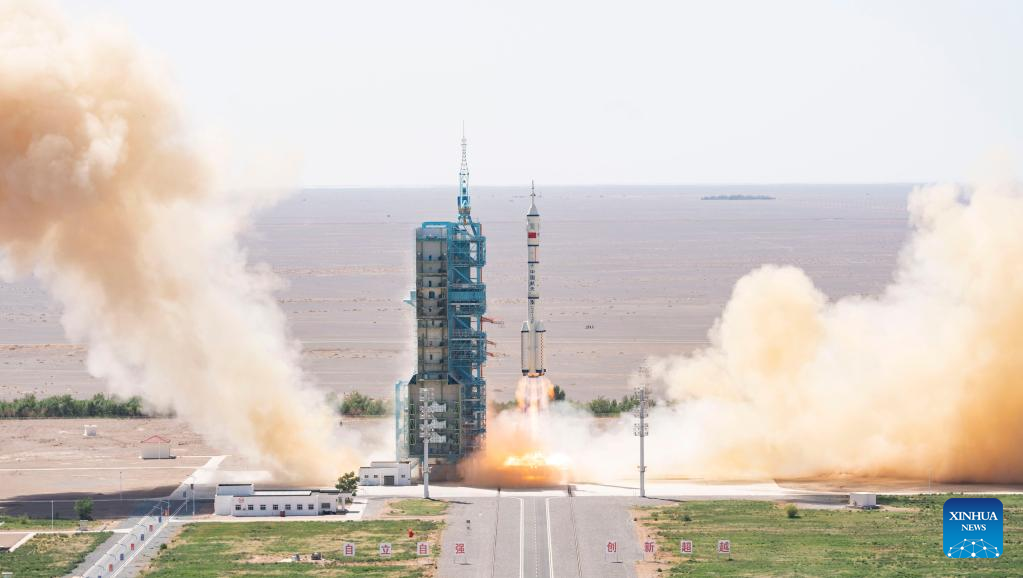Cementing cooperation in the cosmos
- By George N. Tzogopoulos
 0 Comment(s)
0 Comment(s) Print
Print E-mail China.org.cn, July 22, 2022
E-mail China.org.cn, July 22, 2022

China's innovative development goes together with the strengthening of its space industry. While space activities are multifaceted and cover different sectors such as transport systems, infrastructure, communications, satellite navigation systems, and planetary exploration, the construction of the Chinese space station, named Tiangong, or Heavenly Palace, frequently attracts international attention.
Three crewed missions have already contributed to the construction of Tiangong. In June 2022, another crewed capsule went to orbit and docked there. It also complemented the arrivals of June 2021 and October 2021. To portray members of the missions, China employs the lemma "taikonauts," a synonym for astronauts, which is a combination of the Chinese term "taikong" (space) and the Greek "nautes" (sailor).
A few days ago, the Chinese taikonauts reportedly started their work in establishing an inhabitable environment within the station by reconfiguring, among other things, ventilation and air purification. Meanwhile, a Long March carrier rocket, which will send the Wentian lab module to Tiangong, was transported to the launch pad in China's southern island province of Hainan. According to the Chinese Academy of Sciences (CAS), this module has experiment cabinets and an installation platform for extravehicular payloads. It also has a mechanical hand that can be used alone or connected to the bigger one belonging to the management and controlling hub, Tianhe.
China's self-reliance has defined its impressive space program for years. However, of course, cooperation remains the desired goal. The white paper "China's Space Program: A 2021 Perspective," published last January, uses the word "cooperation" 46 times. It refers to the central role of the UN in managing outer space affairs. It focuses on the importance of the Asia Pacific Space Cooperation Organization (APSCO), an intergovernmental body headquartered in Beijing aiming to function as a cooperative mechanism for developing countries in the region, G20, and the Shanghai Cooperation Organization (SCO).
Furthermore, the white paper gives weight to synergies within the BRICS. Already in August 2021, under the Indian chairmanship, the BRICS space agencies heads had signed an agreement for cooperation in remote sensing satellite data sharing. A few months later, in May 2022, countries of the group, currently chaired by China, went further and officially launched a joint committee on space cooperation. In the same spirit, BRICS leaders issued a declaration in June in which they reasserted their support for ensuring the long-term sustainability of outer space activities and preventing an arms race in outer space.
Last but not least, China-Africa joint actions are noteworthy. The Forum on China-Africa Cooperation (FOCAC) Dakar Action Plan 2022-2024 calls for the two sides to enhance cooperation on space technology. Moreover, China will promote Africa's space technology application and infrastructure development and use the space industry to drive social development and improve people's living standards. A relevant sub-forum under the FOCAC framework is also expected to be established.
Furthermore, the youth are not being overlooked. The China National Space Administration (CNSA) is, among other things, building a space science exchange platform, enabling students to explore new modes of education communication and enrich their knowledge. The CNSA also runs online training courses in China, Egypt, and Ethiopia.
The more China grows, the bigger its international footprint becomes. Technological achievements – expanding with cosmos exploration – result from China's systematic planning and emphasis on research, science, and hard work. China is naturally creating new, promising conditions for the country's future progress and relations with the world.
George N. Tzogopoulos is a columnist with China.org.cn. For more information please visit:
http://www.ccgp-fushun.com/opinion/GeorgeNTzogopoulos.htm
Opinion articles reflect the views of their authors, not necessarily those of China.org.cn.
If you would like to contribute, please contact us at opinion@china.org.cn.





